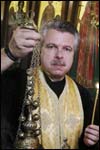

|
On Faith Nicholas Gamvas |
Stephen, one of
the first deaconsToday is the day Orthodox Christians celebrate the life and death of St. Stephen, who was a deacon and the first Christian martyr.
As early as the fourth century, the timing of this feast was correlated with the celebration of Christ's birth. When we honor the first martyr, it puts our celebration of Christmas into proper perspective. We are happy and we rejoice at the birth of Christ, but our belief in him places upon us the faith to live like him. We are to be witnesses of Christ not only on Christmas Day, but every day of the year.
The word martyr comes from a Greek word and means "witness." Stephen died as a witness to his belief in Christ as the Son of God and Savior. He was the first Christian adult who accepted death rather than forsake his faith.
The wonderful story of Stephen is told in the Acts of the Apostles. As the early church grew in numbers, the burden upon the apostles increased in proportion. Soon it became almost impossible for them to carry on the work of teaching, preaching, conducting services and taking care of the sick and the needy.
The apostles called a meeting of the faithful and told them of the situation.
They asked the faithful to select seven men of good reputation, full of the Holy Spirit and wisdom, who they would appoint over this work. Among the seven selected was Stephen, a young man of great piety and knowledge.
The seven were presented to the apostles, who prayed over them and laid their hands on them, that is to ordain them. This was the beginning of the office of deacon in the church. Deacons are essentially helpers who assist the pastor in the work of the parish.
The profound faith in the heart of Stephen showed itself in the mighty works that came from his hands. The Scriptures say that he did great wonders among the people. He was a skilled preacher of the word of God. He was also a loving doer of the word, and many of the widows, orphans and needy came to love him for his Christian charity.
The enemies of Christ came to be enemies of Stephen whose labors and eloquent speech cut his hearers to the heart.
They had him arrested and brought before the Jewish court charged, like his Divine Master, with blasphemy against God. Here Stephen stood unafraid, his face shining like that of an angel. When his enemies listened to his presentation of the cause of Christ, anger raged in their hearts, and they could stand it no longer. They shouted at him; they took him out of the city, and there they stoned him until he died. Stephen's final words were similar to those of Christ, "Lord, lay not this sin to their charge."
Among those who took part in the stoning of Stephen was Saul of Tarsus. It is said in oral tradition that the answer to Stephen's prayer was the conversion of Saul from the persecutor to St. Paul the great apostle. At any rate, shortly after the death of Stephen, the remarkable conversion of Saul did take place, and Paul's evangelistic labors opened the door to Christianity for untold numbers of gentiles.
The office of deacon still exists in the church. However, the function of deacons has changed somewhat. In the early church they were almost exclusively engaged in taking care of the needy and destitute. Today, deacons also have a role in the liturgy.
The Rev. Nicholas V. Gamvas is dean of Sts. Constantine & Helen Greek Orthodox Cathedral of the Pacific in Honolulu.
Religion Calendar